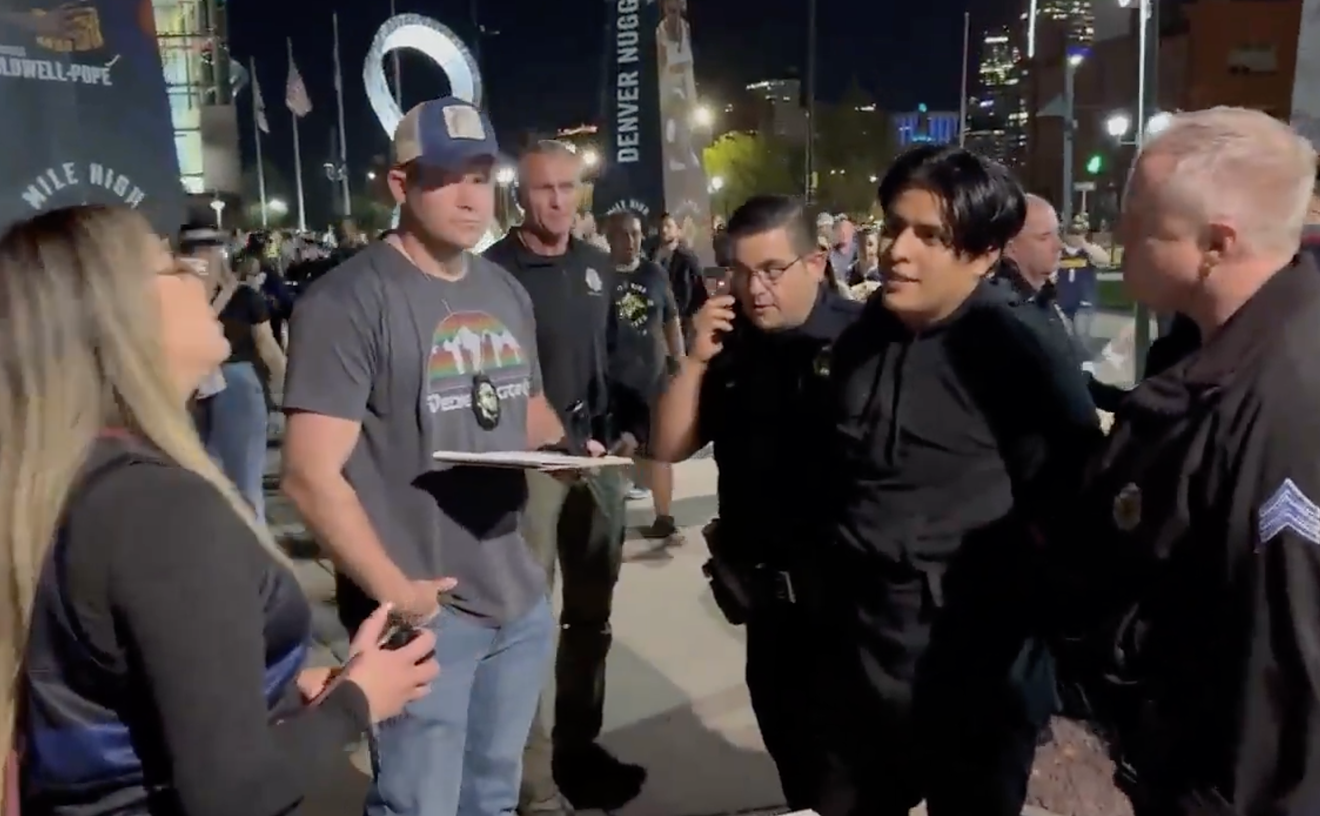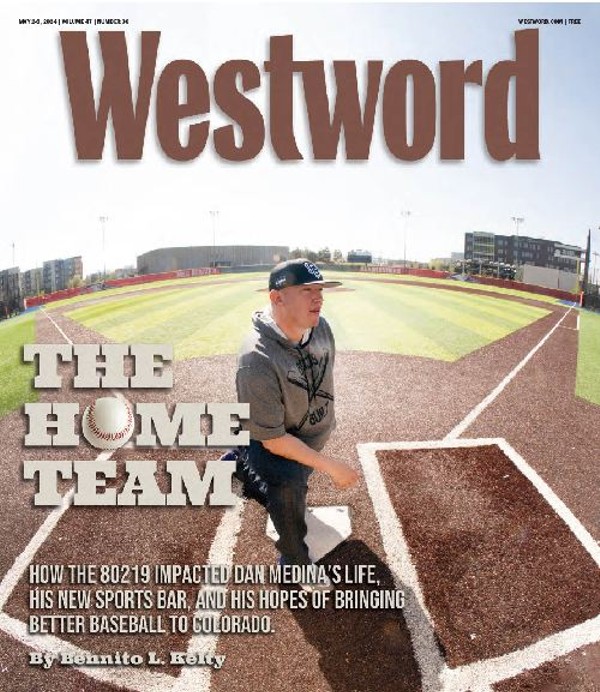Update: Late on Thursday, August 27, a jury sentenced Dexter Lewis to life without the possibility, sparing him the death penalty. Continue for our previous report.
Update about the shut-down of jury nullification advocates' efforts on August 26 follow the first section of this report: Last week, we told you about a request for a preliminary injunction that would prevent protesters from being arrested for advocating jury nullification outside the Lindsey Flanigan courthouse in Denver, where a jury is determining if Dexter Lewis will receive the death penalty for killing five people at Fero's Bar & Grill in 2012. See our previous coverage below.
In addition, Judge Michael Martinez ordered that all protests be banned from the courthouse plaza, where Eric Brandt and Mark Iannicelli had distributed jury nullification pamphlets — the acts for which they were arrested and charged with jury tampering. Jury nullification is the act of jurors finding a defendant not guilty if they believe the law the person broke is unjust.
Attorney David Lane, who represents Brandt and Iannicelli, maintained that the judge had "doubled down" on First Amendment violations via his order.
Now, however, U.S. District Court Judge William Martinez (yes, there are two Judge Martinezes involved) has granted the preliminary injunction and overturned the order, which the defendants (Judge Michael Martinez plus Denver Police Chief Robert White and the City and County of Denver) wanted in place because, in Lane's words, "if Dexter Lewis, who is black, gets a death penalty, and James Holmes" — the convicted Aurora theater shooter, who will be sentenced to life without possibility of parole — "who is white, got a life sentence, there could be civil unrest in the plaza."
This argument is sketched out by Judge William Martinez in an order of his own. It's on view below in its entirety, but here's a key excerpt.
The Second Judicial District called Steven Steadman, who is the Colorado judicial branch’s security administrator. Steadman was closely involved in the discussions leading up to the Plaza Order. Steadman testified that, during those discussions, he was unaware of Brandt and Iannicelli or the distribution of jury nullification literature, and that the Plaza Order actually arose from very different concerns.To Lane, this argument is highly problematic. "In order to get ready for possible civil unrest, they sought to suspend the First Amendment," he says. "But what does eliminating free speech have to do with civil unrest? The answer, given by a federal judge, is nothing."
According to Steadman, discussions began with Chief Judge Martinez in early July 2015 because the Dexter Lewis trial was scheduled to overlap with another death penalty trial in Arapahoe County, i.e., the trial of Aurora theater shooter James Holmes. Steadman and Chief Judge Martinez specifically worried about potentially violent protests that might break out if Lewis (who is black) eventually received the death penalty but Holmes (who is white) did not.
That's not quite how Judge William Martinez put it. In the main, he focuses on whether the order banning protests on the plaza was "narrowly tailored" to achieve its stated goal of preventing civil unrest if Dexter Lewis gets the death penalty — and he found that it was not. Another excerpt:
These are potentially “significant” government interests. Legitimate time-place-manner restrictions in a public forum can be motivated by “objectives [such as] public safety, accommodating competing uses of the easement, controlling the level and times of noise, and similar interests".... But the Court finds on this record that Plaintiffs are likely to succeed in proving that the Plaza Order is not narrowly tailored to these stated objectives.The case doesn't die there, since the plaintiffs plan to appeal the decision, and the office of Colorado Attorney General Cynthia Coffman is expected to offer support.
Lane doesn't think they'll have much success: "They'll have to file papers about why they think the judge is wrong, and the judge would have to say, 'Yes, I was wrong,'" he maintains. "The odds of that happening are pretty remote. So they'll immediately take it to the 10th Circuit and request a stay. But my guess is that the 10th Circuit will also deny the stay."
In the meantime, Lane is calling for the charges against Brandt and Iannicelli to be dropped — and he offers some harsh words about their arrest and the protest-banning order.
"The fact that government officials are fighting as hard as they can to suppress speech should be a wake-up call for Colorado citizens," he allows. "Why are your government officials trying to suppress speech? Why do we have to go to court repeatedly to vindicate the Constitution when these officials are sworn to uphold the Constitution? [Denver District Attorney] Mitch Morrissey should be ashamed of himself, and Cynthia Coffman should be ashamed of herself, too."
Update, August 26: A short time ago, David Lane reached out to the media with news that Denver police officers stopped jury nullification advocates from distributing pamphlets outside the Lindsey Flanigan courthouse despite the order allowing such activity. Here's what Lane wrote:
Outside the courthouse today. Our clients wasted no time in passing out jury nullification literature. The police wasted no time in swooping in after these photos were taken and confiscated the tent, chairs, coolers and other items. Back to federal court…unless Denver responds by noon today. The below email was sent to the attorney general and the city attorney:
Attached are two pictures taken this morning of peaceful pamphleteers passing out jury nullification literature. Moments after these pictures were taken, the Denver police swooped in, led by Commander Lopez and confiscated all of their property including the tent, the table, the chairs, their cooler and anything that was not nailed down. No arrests were made. The pampleteers were outside of the “no speech zone” as earmarked by Judge Michael Martinez which is not subject to his court order.He also included two photos of the set-up on the plaza prior to the police action. Here's the first....
This is clearly retaliation for protected speech. If I don’t hear back from you by noon, we will re-file in federal court seeking a court order prohibiting the rank retaliation. The pictures clearly show that ingress/egress is not being blocked and there is no reason for this heavy handed police action.
I await your response.
...and the second:
Continue to read the order approving the preliminary injunction, followed by our previous coverage.
Lindsey Flanigan Plaza Preliminary Injunction Order
Original post, 9:01 a.m. August 20: Last week, we told you that Eric "Fuck Cops" Brandt had been unable to meet a judge's deadline for removing documents about a police officer's threat from his Facebook page because he'd been jailed in Denver on a charge related to passing out jury nullification brochures in front of the Lindsey-Flanigan Courthouse, where the Dexter Lewis death-penalty trial was taking place.
Since then, the case has taken some bizarre and, in the view of Brandt attorney and free-speech advocate David Lane, troubling turns.
Earlier this week, Lane filed documents (see them below) seeking to, in his words, "enjoin the city and the police from arresting people for handing out literature to passersby outside of the Denver courthouse informing them of the concept of jury nullification."
After a hearing on this issue was set for 2 p.m. Friday, August 21, Chief Judge of the Second Judicial District, Michael Martinez issued an order that banned any protest activities in the courthouse's plaza, whether they have to do with jury nullification or not.
This move incenses Lane, who has now affixed Judge Martinez's name to his previous complaint.
"He's stepped in it in a really big way," Lane says. He feels that "Judge Martinez's solution to speech he doesn't like is to eliminate all free speech."
In July, as we've reported, Brandt and Mark Iannicelli, who also faces charges from the Denver District Attorney's Office, set up camp outside the Lindsey-Flanigan Courthouse and were passing out fliers that featured phrases such as "Your Jury Rights: True or False? What rights do you have as a juror that THE JUDGE WON'T TELL YOU" and "All You Need to Know About Jury Nullification (but were prevented from hearing)."
What is jury nullification? In our previous post, Lane described it like so: "One of the hallmarks of our country is that jurors have the power to not enforce bad laws, despite the fact that the prosecutor has proven guilt. You would see it when marijuana was illegal: Jurors would simply not convict people because they thought the law was unjust. It's a power jurors have and a power that judges and prosecutors take great pains to tell jurors they don't have. Libertarians and others believe jurors act as a bulwark between a free society and a tyrannical society — and they believe that jurors should take part in jury nullification if there's an unjust law."
In Brandt's arrest affidavit, however, officers determined that the fliers "would be in violation of the Colorado Revised Statute regarding jury tampering" — a particularly sensitive subject, because, as the document notes, the death-penalty trial of Lewis, who's now been convicted of killing five people at Fero's Bar & Grill in 2012, was taking place at the time. Hence the arrest of Iannicelli, followed several days later by Brandt. Both have been charged with multiple counts of jury tampering.
Lane regards this prosecution as a violation of Brandt's and Iannicelli's free-speech rights. But beyond defending them in court, he is also seeking to insure that jury nullification leaflets can be distributed at the courthouse in the future.
For now, however, such material is banned from distribution at the courthouse — and that's not all.
Here's text from the order imposed by Judge Martinez this week, as shared by Lane. It's posted on the doors of the courthouse, Lane says.
Pursuant to the authority granted to chief judges of the judicial districts for the State of Colorado…the following Order enters and shall apply to the Lindsey-Flanigan Courthouse:In Lane's view, this order flies in the face of past precedent.
The Court has the responsibility and authority to ensure the safe and orderly use of the facilities of the Second Judicial District, to minimize activities which unreasonably disrupt, interrupt, or interfere with the orderly and peaceful conduct of court business in a neutral forum, free of actual or perceived partiality, bias, prejudice, or favoritism; to provide for the orderly conduct of hearings and trials; to promote the free flow of pedestrian and vehicular traffic on sidewalks and streets; and to maintain proper judicial decorum. Those having business with the courts must be able to enter and exit the Lindsey-Flanigan Courthouse freely, in a safe and orderly fashion and unhindered by threats, confrontation, interference, or harassment. Accordingly, the Court hereby prohibits certain expressive activities on the grounds of the Courthouse, without regard to the content of any particular message, idea or form of speech.
Prohibited Activities: The activities listed below shall be prohibited in the following areas: anywhere inside the Lindsey-Flanigan Courthouse…the areas, lawns, walkways or roadways between the Courthouse and public sidewalks and roads; and any areas, walkways, or roadways that connect public sidewalks and roads to Courthouse entrances or exits. This includes but is not limited to, the Courthouse entrance plaza areas on the east and west sides of the Courthouse as depicted in the highlighted areas of the attached map.
1. Demonstrating: picketing; protesting; marching; parading; holding vigils or religious services; proselytizing or preaching; distributing literature or other materials, or engaging in similar conduct that involves the communication or expression views or grievances; soliciting sales or donations; or engaging in any commercial activity; unless specifically authorized in writing by administration.
"The U.S. Supreme Court has said there are certain places that are traditional for free speech — the typical ones being sidewalks, streets and parks," he explains.
Does the plaza in front of the courthouse qualify? Lane believes it does — and so, he notes, does the City of Denver, as represented by the City Attorney's Office, not the Denver DA's office.
"Yesterday, Denver stipulated that it is a traditional forum for free speech," Lane says. "They agreed that it's traditionally a place where demonstrations occur, where leaflets are distributed, where free speech reigns supreme.
"In order to squelch free speech in a traditional free speech area, the government has to have a compelling reason to do so," he continues. "The government has always had the ability to impose reasonable time, place and manner restrictions on speech, meaning you can't have a brass band outside a hospital at 2 o'clock in the morning. But in order to impose those restrictions in a traditional free speech area, there has to be a compelling to do so. And in this case, there's no compelling reason to suppress it" — since, to him, a dislike of jury nullification brochures definitely doesn't qualify.
On Friday, Lane says, "I'll be asking for a court order granting an injunction against any and all law-enforcement personnel from interfering in any way with the passing out of jury nullification literature." He adds that "the federal court is going to have to address Judge Martinez's order — and a federal judge should say the plaza is a traditional forum for free speech. Judge Martinez's order sets out no compelling reason for suppressing free speech. So his order is enforceable inside the courthouse building, but on the plaza and the grounds surrounding the courthouse, it's not enforceable.
"Oppressive governments from the beginning of time have been the enemies of free speech," Lane argues. "The actions of the district attorney in arresting people for passing out literature they disapprove of, and the actions of Judge Martinez in trying to eliminate all free speech outside the courthouse, are the hallmarks of an oppressive government."
Below, find booking photos of Brandt and Iannicelli, followed by four documents: the complete complaint, a motion for a preliminary injunction and two examples of jury nullification pamphlets that were distributed in the plaza last month.
Jury Nullification Complaint: Motion for Preliminary Injunction
Jury Nullification Complaint: Exhibit 2
Jury Nullification Complaint: Exhibit 3
Send your story tips to the author, Michael Roberts.











